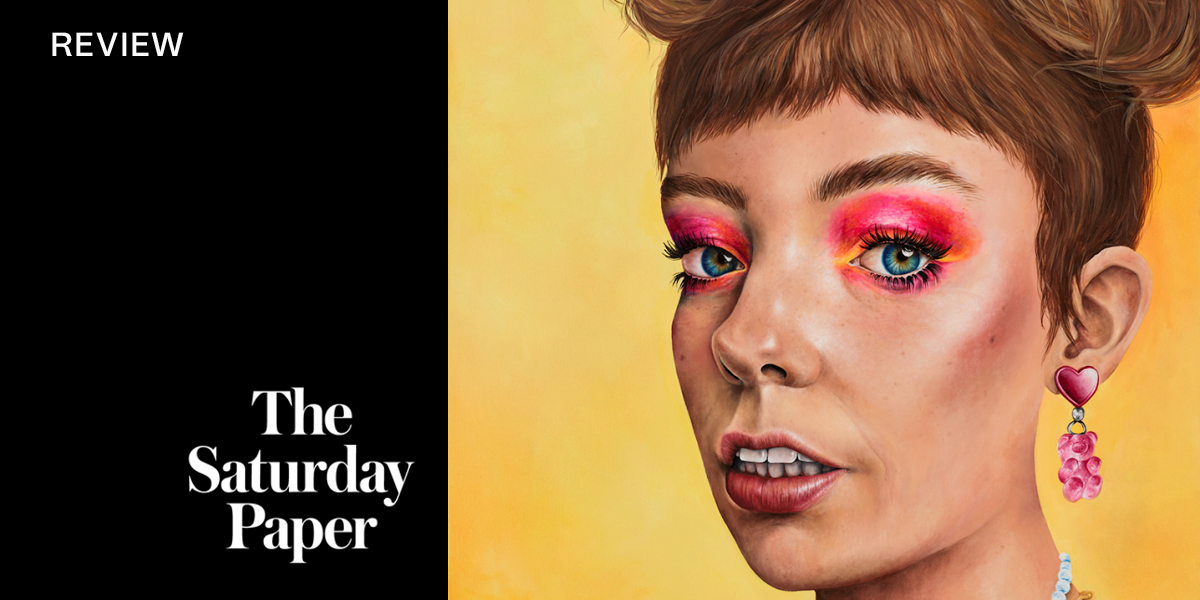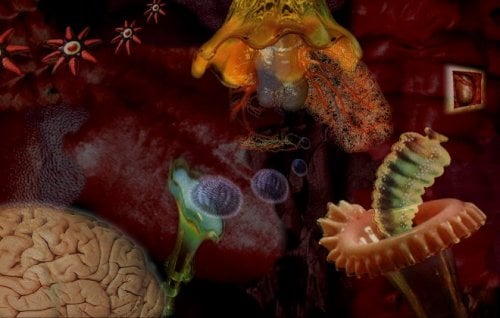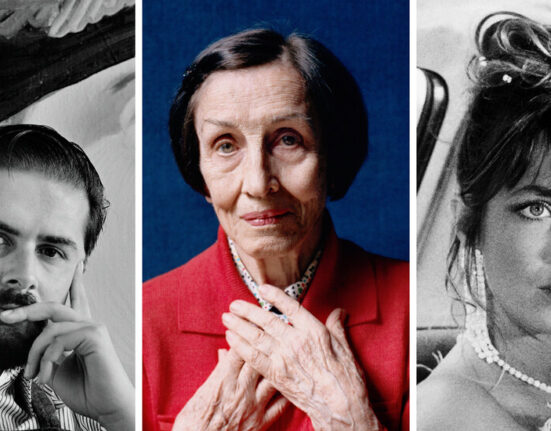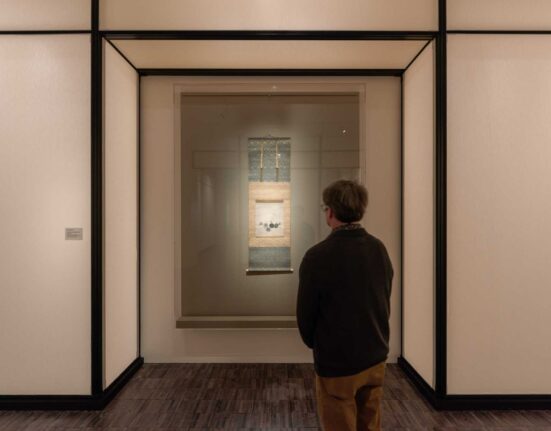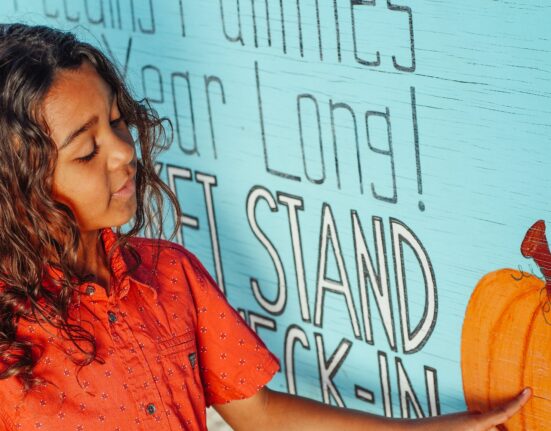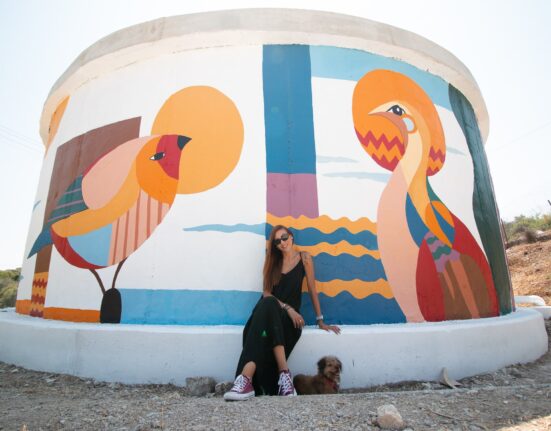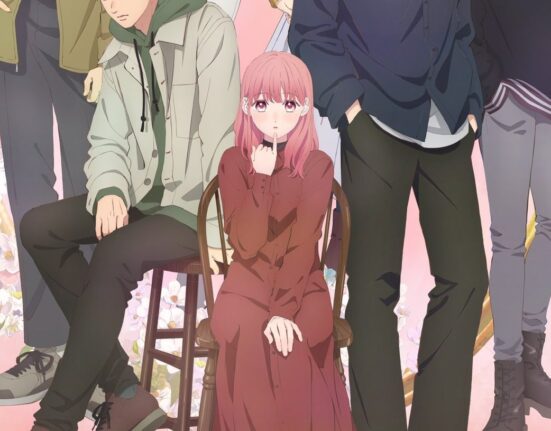As I walk into the foyer of the Art Gallery of New South Wales, I’m already thinking, Good grief, in these days of socials, saturation advertising and a population edging 27 million, do we really still have an appetite for more faces? Yet that is what we are all here for. It is the opening night viewing of the Archibald Prize and waiting downstairs are 57 portraits, all painted in the past year, portraits of some of the most interesting and accomplished of the nation. Their faces. And this great, huge foyer, just past nightfall on an early winter’s evening, is teeming with what feels like a hundred thousand more, all laughing, chatting, smiling, grimacing, chomping hors d’oeuvres, glugging down the champers, faces on show.
There are silverbacks and young hipsters, wrinkled faces and botoxed faces, drag queens in sparkly eyeshadow, grandes dames in sparkly eyeshadow, many moustaches. There are men in three-piece suits, women in leisure suits; there are cocktail frocks and jeans, jumpers and capes; there are polka dots and faux fur and sequins and velvet; some have turned up humblebragging in cargo pants and untucked shirts, and there’s at least one person in a glinty gold tracksuit. There is a lavish distribution of bobbed hair, a regular dotting of butch quiffs. I see at least half a dozen Shannon Bennetts and 20 per cent of the men seem to be Ben Quilty. The faces are a thousand circles in the gloom. It’s 10 minutes into the evening and the noise is incredible.
I fix onto my own face a mild smile and head into the scrum, ready to take it all in: the painters and curators and the sitters themselves, all those icons, the dignitaries and gatekeepers, done up in their finest, hair in topknots, skirts on, boots on, lippie on, the full rig. And of course the faces turn, bright and blank, to study me, and I study them, and we study each other.
The first table of wine glasses I see is defended by no fewer than six staff, standing in front of it in their “Archies” T-shirts to fend off the enthusiastic. There’s another bar at the back and about a thousand glasses of booze on it. Slurping from one I begin to wend about the room. What variety! What strange style! These people are evidently experts at this kind of thing. The literary world simply isn’t like this. I don’t like to cast shade on a recent literary awards event I went to, but next to this it was like a Monday morning department meeting. There’s a discreet flamboyance here, a courageous devotion to art world idiom. The tailoring. The stabby shoes. So many designer spectacles. Has it always been like this? I’ve come in from my reasonably demure regional town; this country mouse’s eyes are widening.
Half an hour’s hectic happy shouting of chitchat and then the stage is mounted. It’s the Wynne and the Sulman and the Archibalds all in one event, of course, a pile-on of talent, a luxury of marvels. There is a gracious Welcome by Uncle Allen. The gallery’s director, Michael Brand, speaks, then the minister for the arts, then David Gonski, in his final year as president of the board of trustees and judging panel. The winners were contacted early this morning, announced at midday, and have had time to write speeches: the Wynne goes to Yolŋu elder and artist Djakaŋu Yunupiŋu for Nyalala gurmilili and the Sulman to Naomi Kantjuriny for Minyma mamu tjuta. Laura Jones wins the Archibald for her portrait of Tim Winton.
She speaks, sweetly and humbly, of her respect for Winton’s environmental activism. She’d persuaded the reluctant writer to sit, and we’d already seen the tender results in the news: Winton in pale brown lines, in an odd, inert pose, like an Egyptian vizier, his body naive in a T-shirt but his face a mesh of anxious tension. It is an unpretentious work, a considered mix of awkwardness and composure. There is something uneasy in its tilt, something compelling in its depths. “I look like I have the weight of the world on my shoulders,” Winton had commented.
She finishes, we clap, are urged to enjoy ourselves and go see the art. My glass is refilled once more by a nice young man. There is a stream of people to the escalator; I descend with them to the show.
This is its 104th year. The Archibald, established of course by Bulletin founder J. F. Archibald, isn’t the richest or most comprehensive art prize in the country, but, by jeez, it’s the best known, the most popular, and one must assume it’s the canny combination of excellent artists and attractive subjects that brings the hordes: a kind of parasocial family album of all those we are impressed by or love to look at. (Disclaimer: my partner has been a sitter for two finalists.)
I can’t decide whether it’s charming and efficient that the art gets the boost from celebrities – and sometimes vice versa – or somehow cynical. Portraits, for a long time, were commissioned by and in the control of the sitter, for status, memorial, promotion, various forms of vanity. Now the sitter is a kind of cargo, their face borrowed for the work, their vanity irrelevant, their character, reputation and name leveraged and applied. Is it that we, now a species devout in self-promotion, understand the face to be a detachable surface, released from our otherwise selves? Here are the dislocated faces of several dozen persons, their individuality celebrated in each frame, but also, somehow, secondary to something else. There’s a kick of fame to be had from being the subject of an Archibald finalist, but it’s an exchange; I wonder how Winton feels, seeing a pinched and exhausted face he might not recognise.
The walls are white and the paintings are bright. On the floor, clusters of attendees stand and wander in the ponderous pace of gallery viewing; on the walls, painted people sit, sprawl, stare, kiss, turn into centaurs, ride on rollerskates, read books, pinch each other’s nipples. Lots of colour! Lots of eyes looking! We look at the portraits, the portraits look at us, we are all moving around, I’m watching the crowd, people in it are turning to watch me back. It feels like the time I went to an aquarium and ended up gazing at visitors as if they were fish. I’m feeling decidedly drunk and in the grip of some revelation: this is the most amazing scene in the world. I have always been here. It is now my eternal destiny to walk, continuously, unspeaking, among a clamorous crowd of strangers, all of us checking each other out, spooky faces staring at us from the walls like a chorus of the dead.
But they aren’t dead. Something else is happening. Am I so drunk I have double vision? There is Jill Dupleix in a dress on the wall, by Zoe Young; and there is Jill Dupleix just in front of her, laughing. Gallerist Vivian Vidulich, with her curtain of black hair, is next to her on the wall (by Karen Black), and Vivian in the flesh, next to Jill. Sami Shah and Kylie Moore-Gilbert (Ben Howe) are sitting in adjacent chairs in their portrait, and I see them drifting past in the next room. Unnerved, the booze still coming on, I come to a picture of Ken Done that has four eyes, and I rub my own, but it’s okay, the artist Thom Roberts has painted it like that.
Some of the artists are also finalists in the Wynne and the Sulman, or have been, and some previous finalists are now sitters. “I’m the artist! I’m George!” a man is saying near me and I feel the rooms tightening around me. It’s wonderful but getting too much, all this gazing, the wild colours, the marvellous skills and the mystifying takes. One picture is photorealist haunting melancholy and the next a psychedelic cartoon; I blink and swerve around the visitors, the drag queens are here, the chatting is immense and I decide on one last drink and go back upstairs. There are now about 5000 people up there. The staff are manning all the bars and my next glass of champagne is in an enormous plastic mug, as big and emptying as an Archibald portrait.
The 2024 Archibald, Wynne and Sulman prizes are on display at the Art Gallery of New South Wales until September 8.
ARTS DIARY
EXHIBITION Pharaoh
National Gallery of Victoria, Naarm/Melbourne, until October 6
LITERATURE Outback Writers Festival
Waltzing Matilda Centre, Koa Country/Winton, June 18-21
VISUAL ART Art for takayna
Long Gallery, nipaluna/Hobart, until June 22
THEATRE Cost of Living
Bille Brown Theatre, Meanjin/Brisbane, until July 13
CULTURE Darwin Pride
Venues throughout Larrakia Country/Darwin, June 20-23
LAST CHANCE
INSTALLATION Dark Spectrum
Wynyard Tunnels, Gadigal Country/Sydney, until June 15
This article was first published in the print edition of The Saturday Paper on
June 12, 2024 as “Detachable faces”.
For almost a decade, The Saturday Paper has published Australia’s leading writers and thinkers.
We have pursued stories that are ignored elsewhere, covering them with sensitivity and depth.
We have done this on refugee policy, on government integrity, on robo-debt, on aged care,
on climate change, on the pandemic.
All our journalism is fiercely independent. It relies on the support of readers.
By subscribing to The Saturday Paper, you are ensuring that we can continue to produce essential,
issue-defining coverage, to dig out stories that take time, to doggedly hold to account
politicians and the political class.
There are very few titles that have the freedom and the space to produce journalism like this.
In a country with a concentration of media ownership unlike anything else in the world,
it is vitally important. Your subscription helps make it possible.

